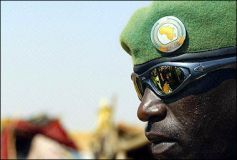Darfur peace hope brightens as parties stride over spiny security protocol
ABUJA, Nov 10, 2004 (Xinhua) — The hope for peace in Sudan’s troubled Darfur region brightened on Tuesday evening as the parties in the 21-month-old crisis signed humanitarian and security protocols together, three weeks into the African Union- sponsored peace talks in Nigeria.

|
|
A Rwandan soldier belonging to the AU Force patrols a section of the Abu Shouk displaced camp in the outskirts of El-Fasher, Sudan. (AFP). |
The signing ceremony in the Nigerian capital Abuja was overseen by Nigerian President Olusegun Obasanjo, also chairman of the African Union (AU), who brokered the ongoing peace talks.
Leader of the government delegation to the talks and Sudanese Agriculture Minister El-Khalifa Majzoub, who signed for the government side, remarked that the signing represented a great leap towards peace in Sudan.
“We are sending a signal to the whole world that we are already for peace in our land. We shall enforce this agreement to bring peace to our people,” he said.
“We are healing our wounds and shall remain grateful to the AU for making this possible.”
Obasanjo also hailed the signing. “This ceremony is the
beginning of a great future for Sudan, the beginning of peace, security, progress, development, friendship and harmony in Sudan.” The Nigerian president however said that the agreements would not be “worth the paper on which they are written if they are not scrupulously implemented on the ground.”
Minni Arkou, secretary general of the Sudan Liberation Movement (SLM), one of the two rebel groups in Darfur, who signed for his party, echoed his doubts, saying that the issue was not in signing, but actually implementing the agreements.
“We on our part will honor all the agreements, but we only pray that at the next round of talks, we do not come back here to complain about (ceasefire) violations,” he said.
Ahmed Tugod, spokesman for the Justice and Equality Movement (JEM), the other rebel group in Darfur who signed for his side, told reporters: “This is indeed a great achievement, but the most important achievement will be in implementing the agreements. We want to see the consequence of signing this agreement on ground.”
“These agreements should bring peace, justice, and order to Darfur and bring back all displaced persons and refugees that had deserted their natural areas of abode,” Tugod said.
In his remarks, Sam Ibok, representative of the AU chairman warned the groups against violating the agreements, and threatened that the AU ceasefire commission shall descend heavily on any defaulting group.
The Abuja talks, another effort by the AU to solve African problems by Africans, opened two weeks ago.
The Sudanese government previously refused to sign the security protocol over a proposal to create a no-fly zone all over Darfur, also blocking the signing of the humanitarian protocol agreed at the first round of talks two month ago.
With the two issues now put behind, the talks would now concentrate on the political issues as all sides had submitted their “declaration of principles” to the AU mediating team.
The talks are expected to take a short break and to resume later in the day.
Clashes in Sudan’s Darfur flared up in February 2003, and has so far caused thousands of deaths and sent about one million fleeing to neighboring Chad or internally displaced.
